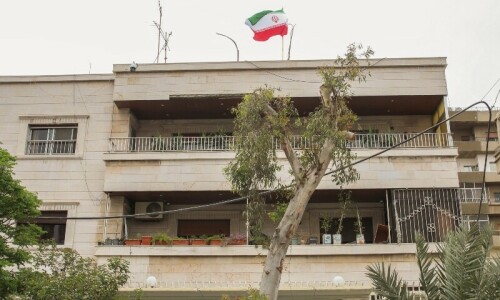THE Middle East, indeed, the entire international community, was on tenterhooks after Israel struck the consular section of Iran’s embassy in Damascus on April 1.
While Tel Aviv has been striking Iranians and their allies in Syria for over a decade, since the beginning of the Syrian conflict, this incident was different, and was seen by Tehran as a declaration of war.
It was the first time Israel hit an official Iranian facility, killing several members of the Sepah-i-Pasdaran, including two senior generals. Tehran’s response to this provocation was expected, and it came late on Saturday, in another ‘first’, as the Islamic Republic rained a barrage of drones and missiles directly on Israel.
From here, it is into the unknown: either diplomacy and de-escalation can kick in and bring the region, and the world, back from the brink. Or a catastrophic conflagration can ensue, resulting in more devastation, bloodshed and global economic misery.
Israel’s Western friends — particular the US and many European states — have used sanctimonious adjectives to denounce Tehran’s ‘reckless’ counterstrike, and have reiterated their ‘ironclad’ commitment to Israel’s defence.
The rest of the international community, including UN Security Council members China and Russia, have taken a more measured approach, emphasising de-escalation. Pakistan has also highlighted the need to “stabilise the situation and restore peace”. The fact is that Israel, by attacking Iran’s diplomatic facilities and violating Syrian airspace, is largely responsible for this dangerous situation. And its recklessness must be reined in.
There was, of course, tremendous domestic pressure on the Iranian government to retaliate, and Tehran appears to have taken the pragmatic route by demonstrating its deterrence capability, while stepping back from all-out war. Iranian officials have said the matter is “concluded”, though top generals say if Israel responds, Iran will again hit back.
This is a very dangerous moment for the international community. Instead of mollycoddling Israel, the Western bloc needs to prevent it from taking more provocative steps. If Tel Aviv does take further military action against Iran, then all bets are off, and a full-scale war could be inevitable. The path towards de-escalation is clear. Israel must immediately end the slaughter in Gaza, which is the key driver of the current confrontation in the Middle East.
Moreover, it must cease its roguish acts of targeting sovereign states including Iran, Lebanon and Syria. If the West keeps talking tough, it will embolden Israel and could drag the US and Europe into a shooting war with Iran and its regional allies.
This is what Benjamin Netanyahu may actually want, to take the world’s attention away from the massacre in Gaza, and to fight Iran to the last American. Deft statesmanship is the need of the hour to prevent a devastating showdown.
Published in Dawn, April 15th, 2024














































Dear visitor, the comments section is undergoing an overhaul and will return soon.